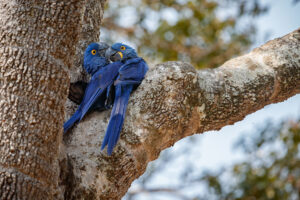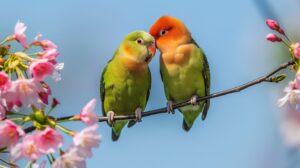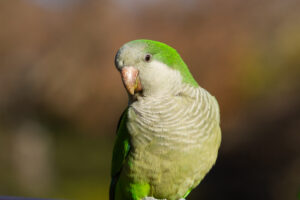Introduction
The golden conure, a spectacular bird that captivates with its radiant yellow plumage and charismatic personality, holds secrets that many prospective and current bird owners often overlook. Native to the Amazon Basin of Brazil, this vibrant species (also known as the golden conure parrot) has fascinated avian enthusiasts for decades. However, behind its dazzling appearance lie several crucial facts that deserve attention.
As exotic pet ownership continues to rise across the United States, understanding the complete picture of golden conure care becomes increasingly important. While their stunning appearance and playful antics make them desirable companions, there are significant considerations regarding their golden conure lifespan, behavior, legal status, and specific needs that potential owners must acknowledge.
This comprehensive guide reveals four shocking truths about the golden conure that every bird lover should know before bringing one home. Whether you’re researching golden conure price points, considering a golden conure for sale listing, or simply expanding your knowledge about this magnificent species, these insights will provide valuable perspective on what it truly means to welcome a golden conure pet into your life.

Truth #1: The Golden Conure’s Endangered Status Has Serious Implications
When admiring the brilliant yellow feathers of a golden conure, few people realize they’re looking at a species that has faced significant conservation challenges. The golden conure, scientifically known as Guaruba guarouba, has a complicated history with endangerment that directly impacts potential owners.
The Conservation Reality
The golden conure is currently listed as “vulnerable” on the International Union for Conservation of Nature (IUCN) Red List. While this represents an improvement from its previous “endangered” status, the species remains under threat primarily due to:
- Habitat loss: The Amazon rainforest, the golden conure’s natural habitat, continues to face deforestation at alarming rates.
- Illegal trapping: Despite protective regulations, golden conures are still captured illegally for the pet trade.
- Limited distribution: The golden conure habitat is restricted to a relatively small area in northeastern Brazil, making the species particularly vulnerable to environmental changes.
According to the World Parrot Trust, golden conure population estimates range from 10,000 to 20,000 individuals in the wild. While conservation efforts have shown positive results, their numbers remain concerning for long-term species survival.
Legal Implications for Ownership
The golden conure’s vulnerable status has direct consequences for those interested in keeping these birds as pets:
- CITES protection: Golden conures are listed under Appendix I of the Convention on International Trade in Endangered Species (CITES), restricting international trade.
- Permit requirements: In the United States, legal ownership of a golden conure typically requires proper documentation proving the bird was bred in captivity.
- State-specific regulations: Some states have additional restrictions on keeping golden conures as pets.
For those considering a golden conure for sale option, verifying the legality and proper documentation is absolutely essential. Reputable breeders will provide certificates of captive breeding and appropriate permits. The golden conure legal status means potential owners must exercise due diligence when purchasing these birds.
The Ethical Consideration
Beyond legality, there’s an ethical dimension to consider. Supporting responsible breeding programs for golden conures can actually contribute to conservation efforts by reducing demand for wild-caught birds. However, this requires careful research to ensure you’re working with breeders committed to ethical practices and genetic diversity.
Organizations like the American Federation of Aviculture provide resources on conservation-minded captive breeding programs that help preserve the golden conure while meeting the demand for these birds as pets in a responsible manner.
The golden conure’s vulnerable status represents the first shocking truth prospective owners must confront. While legal ownership is possible, it comes with significant responsibility toward conservation of this remarkable species.
Truth #2: The Real Cost of Golden Conure Ownership Will Surprise You
When prospective bird owners inquire about the golden conure price, they’re often unprepared for the complete financial picture. The initial purchase price represents only a fraction of the lifetime investment required for proper golden conure care.
The Initial Investment
The upfront golden conure price typically ranges between $2,000 and $3,000 for a captive-bred bird from a reputable breeder in the United States. This price point alone places golden conures among the more expensive parrot species available in the pet trade. However, this initial purchase cost is merely the beginning.
Essential Setup Costs
Providing an appropriate environment for a golden conure requires substantial investment:
- Proper cage: A suitable golden conure cage costs $500-$800 for a minimum recommended size (at least 36″ x 24″ x 36″). Quality matters tremendously for safety and durability.
- Cage furnishings: Perches, toys, food dishes, and other accessories can easily add another $200-$300 initially.
- Play area/stand: A separate play area outside the cage is essential, adding $100-$200.
- Initial health check: An avian veterinary examination runs $100-$200.
Ongoing Annual Expenses
The golden conure lifespan averages 25-30 years in captivity, creating a long-term financial commitment:
- Diet: High-quality pellets, fresh fruits, vegetables, and occasional nuts for a proper golden conure diet cost approximately $800-$1,000 annually.
- Toys and enrichment: Golden conures are highly intelligent and require regular new toys to prevent boredom and destructive behaviors, costing $300-$500 yearly.
- Veterinary care: Routine check-ups range from $200-$400 annually, with emergency care potentially adding thousands.
- Cage maintenance: Replacement parts, cleaning supplies, and occasional cage upgrades add $100-$200 yearly.
The Lifetime Investment
When considering the golden conure lifespan of potentially 30+ years, the lifetime cost of ownership can exceed $30,000 to $40,000. This represents the second shocking truth about golden conures—they are a significant financial commitment that extends far beyond the initial purchase price.
As noted by PetsPump’s guide on exotic bird ownership, proper budgeting for long-term care is essential when considering any parrot species with a substantial lifespan. The golden conure’s price of ownership should be carefully evaluated against one’s long-term financial stability.
For those seriously considering bringing a golden-conure pet into their home, creating a dedicated savings fund for veterinary emergencies and long-term care is strongly recommended by avian welfare organizations.

Truth #3: Golden-Conure Behavior and Noise Levels Can Be Challenging
Perhaps the most shocking truth for many prospective owners relates to the golden-conure behavior patterns and vocalization tendencies. Despite their stunning appearance and playful nature, golden conures present several behavioral challenges that can test even experienced bird owners.
Vocal Expression and Noise Level
The golden-conure noise level ranks among the loudest of companion parrots, a fact that surprises many first-time owners:
- Volume capacity: Golden conures can produce calls reaching 120 decibels—comparable to a rock concert or chainsaw.
- Frequency of vocalization: They typically have multiple daily “calling periods,” especially during morning and evening hours.
- Carrying distance: Their vocalizations can be heard up to a quarter-mile away in open areas.
According to avian behavior specialists, the golden conure talking ability doesn’t generally include clear speech like African grey parrots or some other species. Instead, their vocalization consists primarily of loud contact calls and alarm screams that serve important social functions in the wild but can be problematic in residential settings.
Intelligence and Enrichment Requirements
The golden-conure’s high intelligence creates another behavioral dimension that demands attention:
- Mental stimulation needs: Golden-conures require 3-4 hours of daily interaction and enrichment to prevent behavioral problems.
- Problem-solving abilities: They quickly figure out cage latches and household mechanisms, necessitating bird-proofing measures.
- Emotional sensitivity: Golden-conures form deep bonds with caretakers and can develop behavioral issues if they feel neglected.
Research published in the Journal of Avian Medicine and Surgery has demonstrated that golden-conures and related large parrots require more complex enrichment than previously understood. Without adequate mental stimulation, golden-conures commonly develop destructive behaviors, excessive screaming, and even self-harming habits like feather plucking.
Social Requirements
In their natural golden-conure habitat, these birds live in small flocks, which translates to specific social needs in captivity:
- Attention demands: Golden-conures typically require 2-3 hours of direct social interaction daily.
- Bonding patterns: They often bond intensely with one family member, sometimes becoming possessive or aggressive toward others.
- Loneliness susceptibility: Golden conures can develop depression-like symptoms if left alone for extended periods regularly.
The golden conure personality is characterized by high energy, curiosity, and strong emotional attachment. While these traits make them engaging companions, they also create significant demands on owners’ time and emotional resources. As PetsPump’s article on parrot emotional needs highlights, meeting these social requirements is non-negotiable for maintaining a healthy bird.
Training Challenges
Despite their intelligence, golden-conures can present training challenges:
- Inconsistent response: Golden-conures may be enthusiastic learners one day and stubbornly resistant the next.
- Boundary testing: They frequently push limits and challenge established rules.
- Hormonal periods: During breeding seasons, even well-trained golden-conures may become temporarily uncooperative or aggressive.
This third shocking truth—the complex behavioral needs and significant noise production—represents the most common reason for golden-conure rehoming. Potential owners must honestly assess whether their lifestyle, living situation, and patience levels align with these behavioral realities.
Truth #4: Physical Care Requirements Are More Intensive Than Most Realize
The final shocking truth about golden-conures concerns their specialized physical care requirements. Despite their robust appearance, golden-conures need precise environmental conditions and preventative health measures to thrive in captivity.
Size and Space Requirements
The golden-conure size is larger than many prospective owners anticipate:
- Length: 13-14 inches (33-36 cm) from beak to tail tip
- Weight: 250-280 grams
- Wingspan: Approximately 7-8 inches when fully extended
These dimensions necessitate significantly more space than smaller parrot species. The minimum golden conure cage size should be 36″ × 24″ × 36″, but larger is strongly preferred. Additionally, golden conures need daily out-of-cage time in a bird-proofed area for exercise and exploration.
Environmental Sensitivities
Golden-conures have evolved for specific environmental conditions that must be replicated in captivity:
- Temperature stability: They require ambient temperatures between 65-85°F (18-29°C), with any rapid fluctuations potentially causing health issues.
- Humidity needs: Optimal humidity ranges from 50-70%, often requiring supplemental humidification in dry climates.
- Air quality concerns: Golden conures are extremely sensitive to airborne toxins, including cooking fumes, cleaning products, candles, and air fresheners.
Research from avian veterinary journals indicates that respiratory issues are among the most common health problems in captive golden conures, often stemming from suboptimal environmental conditions. Air purification systems are considered essential equipment for households with these sensitive birds.
Specialized Diet Requirements
The golden-conure diet in captivity must closely mirror their natural nutritional intake:
- Base diet: High-quality formulated pellets (40-50% of diet)
- Fresh components: Daily variety of fresh vegetables and fruits (45-50%)
- Protein sources: Limited nuts, seeds, and occasional lean protein (5-10%)
- Toxic foods: Avocado, chocolate, caffeine, alcohol, and many common household foods are toxic
According to avian nutritionists, dietary imbalances represent the leading cause of reduced golden conure lifespan in captivity. Their specialized digestive systems require precision nutrition that many owners find challenging to maintain consistently over decades.
Grooming and Hygiene
Maintaining proper hygiene for a golden-conure involves several regular procedures:
- Bathing opportunities: Access to bathing 3-4 times weekly
- Nail maintenance: Trimming every 2-3 months
- Wing feather management: Decision regarding flight feather clipping must be made with safety considerations
- Environmental cleaning: Cage cleaning daily, with deep cleaning weekly
These grooming requirements demand significant time commitment from owners throughout the golden conure lifespan. As detailed in PetsPump’s comprehensive bird grooming guide, neglecting these aspects can lead to serious health complications.
Specialized Veterinary Care
Perhaps most challenging is the requirement for specialized veterinary care:
- Avian veterinarian: Regular access to a veterinarian with specific training in avian medicine is essential
- Preventative testing: Annual blood work, fecal examination, and physical assessment
- Emergency care access: Immediate veterinary intervention capability for respiratory distress, injuries, or sudden behavioral changes
Many regions have limited access to qualified avian veterinarians, potentially requiring travel of significant distances for proper care. This represents a logistical challenge that prospective owners must address before bringing a golden conure into their home.
Golden-Conure vs Sun Conure: Critical Differences
When researching conure species, many prospective owners compare the golden-conure vs sun conure options. While both birds share some similarities in appearance and temperament, understanding their differences is crucial for making an informed decision.
Physical Differences
- Size: The golden conure is significantly larger, averaging 13-14 inches compared to the sun conure’s 10-12 inches.
- Coloration: Golden-conures are predominantly bright yellow with green flight feathers, while sun conures display a blend of yellow, orange, red, and green.
- Lifespan: The golden-conure lifespan averages 25-30 years, slightly longer than the sun conure’s typical 20-25 years.
Behavioral Distinctions
- Noise level: While both species are loud, the golden-conure noise level is generally higher in volume and more penetrating.
- Talking ability: Neither species excels at speech, but sun conures typically develop slightly larger vocabularies than golden-conures.
- Activity level: Golden conures tend to be more active and require more space for movement and play.
Care Requirements
- Space needs: Golden-conures require larger cages and more spacious play areas than sun conures.
- Social needs: Both species need significant social interaction, but golden-conures typically demand more consistent attention.
- Dietary specifics: While both have similar dietary frameworks, golden-conures often require more precise nutritional management.
Acquisition Considerations
- Price point: The golden-conure price typically ranges from $2,000-$3,000, while sun conures generally cost $600-$1,000.
- Availability: Sun conures are much more readily available from breeders across the United States.
- Legal status: Golden -face more regulatory restrictions due to their vulnerable conservation status.
As discussed in PetsPump’s conure species comparison guide, these differences highlight why the choice between these species should involve careful consideration of one’s specific situation, resources, and expectations.
Golden-Conure Breeding: Not for Novice Bird Keepers
For those interested in golden-conure breeding, it’s important to understand that this represents one of the most challenging aspects of the species. Successful breeding programs require extensive knowledge, specialized equipment, and dedication to genetic diversity.
Breeding Challenges
- Sexual maturity: Golden conures typically reach breeding age at 3-4 years
- Pair bonding: Successful pairs must be carefully matched and may take 1-2 years to form proper bonds
- Nesting requirements: Specialized horizontal nesting boxes with specific dimensions are required
- Clutch information: Typically 2-4 eggs per clutch, incubated for approximately 28 days
- Hand-rearing complexity: Hand-raising chicks requires precision feeding schedules and temperature control
Genetic Considerations
Professional golden conure breeding programs prioritize genetic diversity to maintain health and vigor in the captive population. This requires:
- Detailed lineage records: Maintaining multi-generational pedigrees
- Genetic testing: Screening for heritable conditions
- Breeding rotation: Working with other breeders to maintain genetic diversity
Legal Requirements
In the United States, breeding golden conures legally requires:
- Special permits: Federal permits specifically for breeding endangered species
- Sales documentation: Proper documentation for each bird sold
- Reporting requirements: Annual reporting to wildlife authorities
The complexity and regulatory requirements surrounding golden conure breeding make it unsuitable for casual or inexperienced bird keepers. Those seriously interested in contributing to conservation through breeding should first gain experience with more common species and connect with established golden conure conservation breeding programs for mentorship.
Conclusion: Is a Golden Conure Right for You?
After exploring these four shocking truths about the golden conure—their endangered status, true ownership costs, behavioral challenges, and intensive care requirements—potential owners can make more informed decisions about whether this species is truly compatible with their lifestyle, resources, and expectations.
The golden conure represents one of the most beautiful and charismatic parrot species available in the companion bird trade. Their brilliant yellow plumage, playful demeanor, and capacity for deep bonds make them extraordinarily rewarding companions for the right owners. However, these qualities come with substantial responsibilities that cannot be overlooked.
Before pursuing a golden conure for sale opportunity, consider these final recommendations:
- Experience requirement: Gain experience with less demanding parrot species before considering a golden conure pet.
- Lifestyle evaluation: Honestly assess whether your home environment, schedule, and family situation can accommodate the significant needs of this species.
- Financial planning: Create a detailed budget covering both initial golden conure price and long-term care costs over their potential 30-year lifespan.
- Veterinary access: Confirm access to qualified avian veterinary care within a reasonable distance.
- Support network: Connect with experienced golden conure owners through clubs or online communities for ongoing guidance.
For those who can meet these considerable requirements, golden conures offer an incomparable companion experience. Their intelligence, beauty, and affectionate nature have earned them devoted followings among serious bird enthusiasts across the United States.
As with any exotic pet decision, responsible ownership begins with thorough research and honest self-assessment. By understanding these shocking truths about golden conures before bringing one home, you contribute to better outcomes for both the birds and their human caretakers.
For more comprehensive information on exotic bird care, proper housing setups, and nutritional guidance, explore our detailed resources at PetsPump’s bird care section. Our commitment to responsible exotic pet ownership includes providing the educational foundation necessary for successful long-term relationships with remarkable species like the golden conure.
Resources for Golden Conure Owners
- World Parrot Trust – Golden Conure Conservation
- Association of Avian Veterinarians
- American Federation of Aviculture
- Lafeber’s Nutritional Guidelines for Conures
- PetsPump’s Complete Guide to Parrot Care
- U.S. Fish and Wildlife Service – CITES Information
- Avian Welfare Coalition
This article is for informational purposes only and does not substitute for professional veterinary advice. Always consult with an avian veterinarian regarding the specific needs of your golden conure.
Last updated: May 9, 2025






